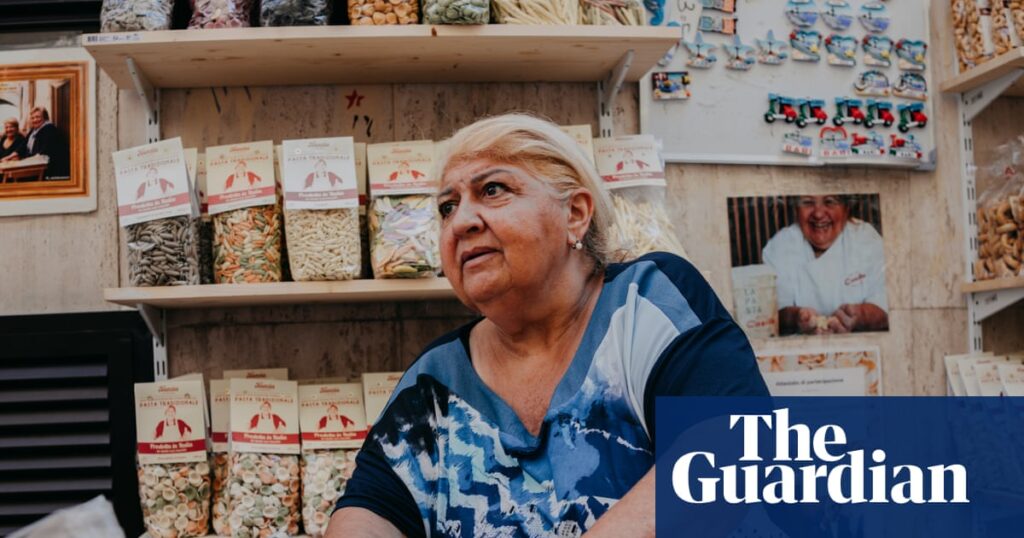Nunzia Caputo was five years old when her grandmother put a stop to her playing on the street outside their home in Bari and summoned her to help make orecchiette, the ear-shaped pasta believed to have originated in the southern Italian port city, to be sold to passersby.
“I used to go out to play every afternoon with my friend Giulia,” said Caputo, now 67. “But then, on a whim, my grandmother said I wasn’t allowed to do that any more. She told me: ‘From now on, you must learn how to make orecchiette.’ I started to cry.”
There were more tears as Caputo was taken to task over her first sub-par attempts. But before long she was skilfully turning chunks of semolina dough into thin, snake-like rolls, cutting off small pieces of the end and nimbly using her thumb to create the distinctive, concave shape.
Since then, she has not stopped. Caputo is the most well-known of Bari’s so-called pasta grannies, a small group of women who from the doorsteps of their homes along Via dell’Arco Basso, a cobbled alleyway in the heart of the city’s old town, make and sell all day, every day.
The historic street’s irresistible blend of the grannies, homemade pasta and fresh laundry billowing from balconies has been a major pull for tourists, catapulting the area – once a no-go zone because muggings were rife – to worldwide fame and bringing prosperity to the women and city.
But with the meteoric success have come pitfalls. The neighbourhood was rocked in August when plainclothes police officers showed up and confiscated stacks of orecchiette and pasta-making equipment amid allegations that some of the women were sourcing commercially produced pasta and passing it off as their own. Some were also accused of flouting food safety standards and fiscal rules.
Three of the women were fined €5,000 (nearly £4,400) for fraudulent commercial activities. Infuriated by the raids, the grannies downed tools and barricaded entrances to the street in a show of resistance.
The raid was part of an investigation launched by Bari prosecutors last year and still ongoing to establish whether there is any truth to accusations revolving around factory-made orecchiette.
Doubts over the pasta’s authenticity have lingered for years but became more prominent as a result of Bari’s post-pandemic boom in tourism, especially from cruise ships docking in the city’s port.
Local journalists probed while some tourists, suspecting they were being ripped off, shared videos on social media. Some of the women are alleged to have bought packets of industrial orecchiette and emptied the contents into clear plastic bags before selling them as their own.
Authorities said the most conspicuous evidence was piles of cardboard boxes for factory-made pasta found dumped in wheelie bins on the outskirts of the old town.
Caputo, who offers orecchiette masterclasses and travels the world to promote the pasta’s tradition, counts the British chef Jamie Oliver among her celebrity friends and says she will always cherish her encounter with the late Pope Francis, to whom she gave a packet of her produce. Photos taken with various visiting politicians, including a former prime minister, Giuseppe Conte, adorn her walls.
She was not among the women fined but said she felt “terrified” by the police blitz, as if the women had been hoarding “guns or drugs” instead of innocently making pasta.
The pasta grannies came together in a show of solidarity after the raids but otherwise rivalries rumble beneath the surface. Most are tight-lipped about the investigation but one pasta maker freely admitted to cutting corners and selling the industrial stuff. “Yes, I was fined,” she said, declining to reveal her name. “But what else was I supposed to do? Demand was such that I couldn’t keep up.”
She said it was impossible for the women to cater to all the tourists. “Look at them all gawping and taking photos as if I’m a relic in a museum. It never used to be this way.”
Pietro Petruzzelli, a city councillor, said the council supported the tradition but “what they can’t do is sell industrial pasta. Our position is one of respect for the rules. So now we’re going through a process of ensuring they’re all compliant.”
The grannies’ woes may be far from over. Gaetano Campolo, the chief executive of Home Restaurant Hotel, which connects food enthusiasts with home chefs and hosts, made the legal complaint that triggered the investigation and is determined that prosecutors see it through. He criticised Bari council for trying to make a tourist attraction out of something he claimed had “no legal basis”.
“It’s a dangerous operation that betrays honest, law-abiding citizens,” he alleged.
But Caputo, who is preparing to travel to Singapore to promote orecchiette, brushed the investigation off. “I feel beleaguered by all of this,” she said, “but I will not stop doing this work.”

